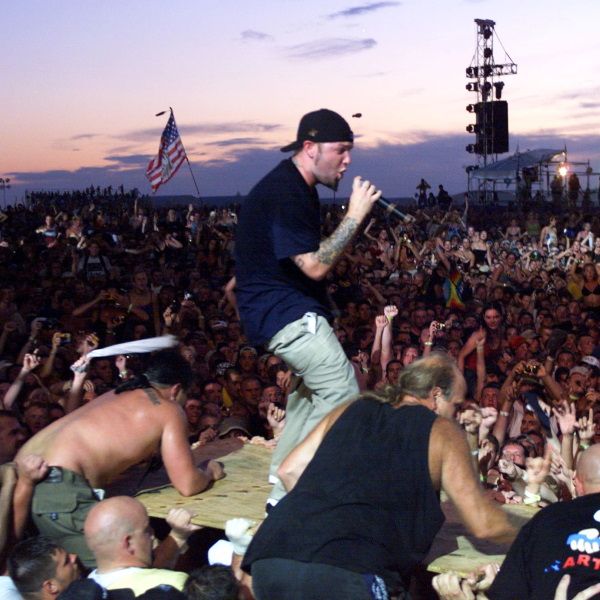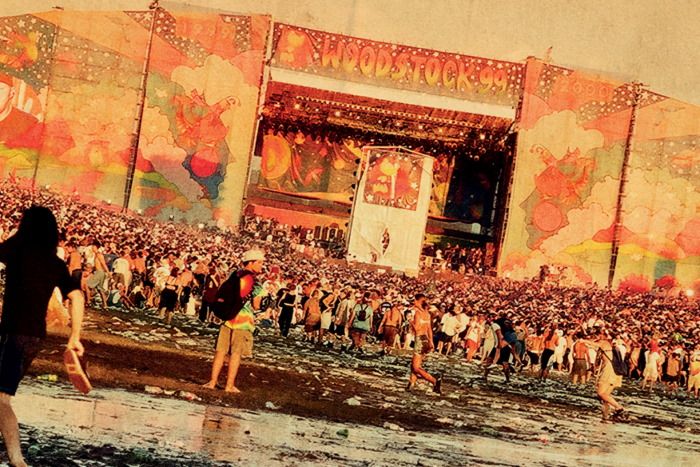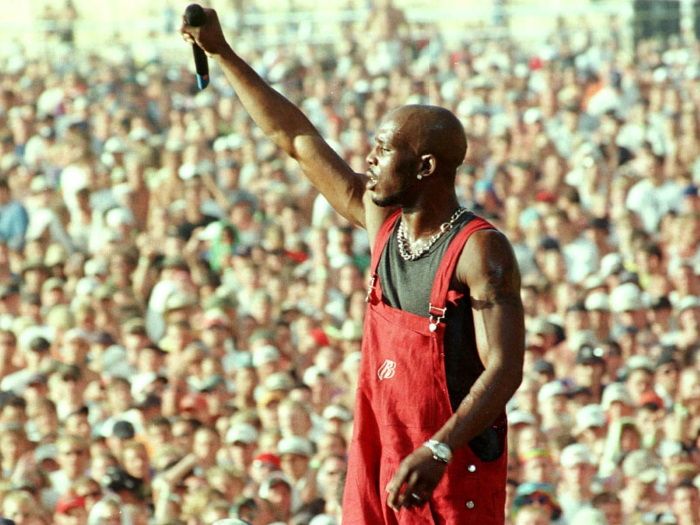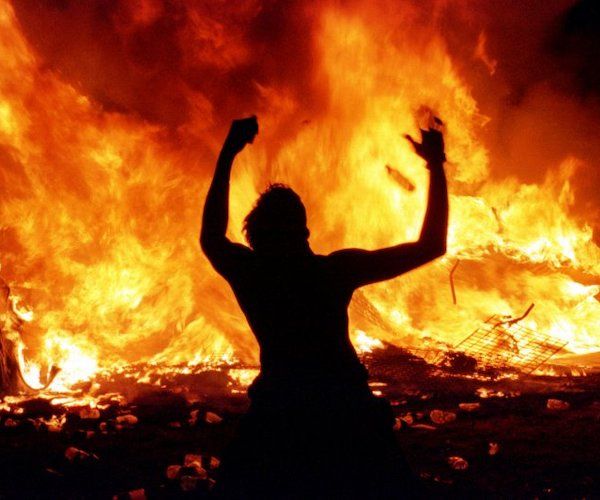The saying goes, “If you can remember Woodstock, you probably weren't there.” That was said of the original music festival with that name in 1969. A new documentary demonstrates that many who were there at Woodstock ’99 do indeed remember it - but for all of the wrong reasons.
The fest was held 22-25 July at the mostly disused Griffiss Air Force Base in Rome, New York. To my mind, it’s notorious for beginning with extreme heat and a lack of water before descending into chaos with rapes, riots, and large bonfires. It’s this Lord of the Flies madness that interests the makers of the new documentary Woodstock 99: Peace, Love, and Rage. I watched it recently and was inspired to write a bit about it. I even took notes on the back of an envelope during my viewing about issues that stood out to me. Let me start with my first scribblings: a criticism.
About a third of the way through the movie features interviewees positing that the violence and chaos at Woodstock 99 was a reflection of that era’s zeitgeist which, they claim, was characterized by brutality, misogyny, and the like. The movie doesn’t really try to form an argument so what you get is mainly a lot of people simply offering their opinions on the times in hindsight.
A couple people hailed c1992-94 was a pop culture golden age when grunge musicians banished hair metal and boy bands to usher in a Pax Nirvana, a time when women were generally viewed as equals. This utopia ended as grunge’s popularity waned and pop music took on a violent anti-woman edge – witness nu metal. As did pop culture generally perhaps culminating in 1999 with Fight Club’s toxic masculinity and the stylized violence of The Matrix. I think it's silly to use a couple violent films as proof for society's violent orientation. As if such filmic violence was new to that time.
For her part, singer/musician Jewel opined that Generation X was like a boat without a rudder as we didn’t have the equivalent of the Vietnam War to unite us in our opposition. Rock critic Steven Hyden says that one of the defining characteristics of the era was the top-down mentality when those at the apex could dictate terms and lord over the plebs.
This armchair sociology is the weakest part of the movie. The sequence is really just a series of unsubstantiated claims made through the lens of pop culture that hastily generalize about a complex time involving millions and millions of people. When the narrative confines itself to the milieu at Woodstock 99, it finds itself on firmer ground, in my opinion. While insisting that the tragedies that played out at the festival were grounded in larger societal trends may be fun, I highly suspect that they may simply be attributed to more general factors as old as humanity itself.
The movie doesn’t really plant its flag on this issue, at least not at this time. It lets subjects offer critiques of society while also having Steven Hyden (who is also a contributing producer) point out that the festival’s problems were foreseeable (and prosaic) yet not acted upon. Another interviewee also says something in retrospect like, “I didn’t think I was the kind of guy who would get drawn into a riot.” As the fires burned at the festival, a guy in his early 20s has a camera thrust at his face and he blurts out, “They’re making money and we’re about getting drunk and partying.”
So you’ve got thousands and thousands of young men with raging libidos and veins pulsing with testosterone in a confined space where the porta-potties can’t be pumped fast enough, the free water has been despoiled by bathers, and it’s 100+ degrees out. Add in booze and the herd mentality that is part and parcel of human nature and it’s little wonder all of that bacchanalian chaos ensued. I think it would have at basically any other period in human history too.
It is appalling to think of all of those sexual assaults and rapes that were perpetrated at Woodstock 99. Official numbers are quite likely very low. The movie notes this and we get an EMT's recollection of dealing with a rape victim while someone else tells of how a woman who was being body passed ended up having multiple men manually penetrate her. To make the matter even more sad, if such a thing is possible, a contemporaneous news clip reports that a security guard was arrested for sexually assaulting a 15 year-old girl.

One of the festival’s organizers, John Scher, is a great interviewee because he provides lots of memorable quotes that deflect blame from himself and the other organizers. He attributes some responsibility to the women who went around half or fully naked for contributing to the excessively hedonistic atmosphere - stirring the pot, you would say. This, unsurprisingly, leads to an accusation of victim blaming from Hyden while one of the women who was at the festival questions whether men are really unable to keep their urges in check and asks, “What does that say about men?” I think posing this question to Camille Paglia would have been a fine addition to the movie.
Scher also blames MTV for focusing on the few bad apples instead of jumping on the team and coming on in for the big win. He also accused Fred Durst, Limp Bizkit’s frontman, of inciting violence. This brings up an interesting subject: the power of music. Did Durst really incite violence with his call for audience members to let their negative energy out? Did the Red Hot Chili Peppers exacerbate an already febrile situation when they covered Jimi Hendrix’s “Fire” as the bonfires were starting? The power of music over our simian minds is an interesting topic but one that, alas, is beyond the purview of the movie.

Overall, I enjoyed the documentary but want to mention one more, albeit minor, criticism of it. I think it would have been interesting to hear people talk about the festival in the immediate aftermath instead of with 20 years distance. Implicit in the movie is the notion that people’s memories of events from 20 years ago are 100% accurate and reliable. What did Jewel, the lead singer from Creed, the guys from The Offspring, Moby, and the guy from Korn have to say on 26 July 1999? And what about those attendees that are featured? Maybe they’d be saying the same things but memory is imperfect. If nothing else, hearing more contemporaneous accounts would provide some relief from a bunch of middle-aged Mrs. Grundy talking heads scolding the youth of yesteryear.
There's also something of a Rashomon effect at play here. People generally agree on what happened - much of the festival exists on videotape, after all - but they give disparate judgements of the events. No one disputes that there were some bad aspects to the festival, but there is vehement disagreement over why they happened and how much significance is to be placed on them. Was the rioting an act of resistance against the capitalists at the top? Or was it sheer pandemonium that we ought to be thankful didn't result in death?
In addition to not delving into the power of music on herds of hairless apes, the movie touches on race and gender but never goes in whole hog. Fair enough. Why were there only 3 female artists booked for the whole weekend? Why was the crowd so white? What was significant about DMX getting all of those white kids to repeatedly shout the n-word? The movie brought up a lot of questions that it didn’t have the time and/or inclination to answer.
I would argue that the documentary ends by finally siding with the armchair sociologists. Festival organizer Michael Lang explains the choice of bands by saying that he wanted Woodstock 99 to be contemporary and not to look back at 1969 and that aggressive music reflected 1999. Was the mood here in America in 1999 especially violent? I don't know the answer to that question but certainly feel that the answer isn't going to come from just a handful of people with anecdotes in hand.
There was much more to the festival than the movie portrays but there is only so much you can do in a couple of hours. While I have not listened to it, there is a podcast documentary called
"Break Stuff: The Story of Woodstock '99" dedicated to this subject which, I believe, was hosted by Steven Hyden who seems to be the dominant chronicler of the festival.






No comments:
Post a Comment